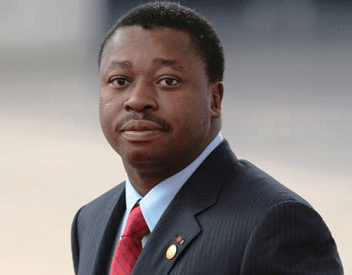Faure Gnassingbe is ECOWAS new Chair

Togolese President Faure Gnassingbé has been chosen by his West African peers to chair the Conference of Heads of State and Government of ECOWAS.
He replaces Liberian President Ellen Johnson Sirleaf, who has headed the sub-regional organisation for a year.
At the 51st Ordinary Session of the Heads of State and Government in Monrovia, Liberia on June 4, 12 out of the 15 ECOWAS leaders who attended the summit decided among other conclusions that Mr Gnassingbe should hold the position for a year.
The Presidents who were not able to attend the Summit included Benin’s Patrice Talon, Niger’s Mahamadou Issoufou, and Nigerian’s Muhammadu Buhari.
In addition to the election of Mr Gnassingbé, the Bloc’s leaders decided to hold their 52nd Ordinary Session in Lomé, Togo, in December 2017; to which they invited the King of Morocco, King Mohammed VI, and his Tunisian and Mauritanian counterparts.
Among the many decisions adopted by the Organisation, Tunisia was granted an observer status; whilst Mauritania’s request to rejoin the ECOWAS would be considered at the 52nd Ordinary Session in Lome, Togo in December.
Morocco, which is also seeking to be an observer in the ECOWAS, was granted that status by the Summit, owing to the strong and multi-dimensional links of co-operation with West Africa.
The Commission was requested to examine the implications of the status in accordance with the provisions of the Revised Treaty of the ECOWAS and to submit the results to the next session.
Owing to the current institutional reforms being undertaken by the regional body, the Summit also decided that the number of statutory post in all the ECOWAS institutions should be reduced, including the scaling down of the number of Commissioners in the Commission from 15 to nine.
The Summit entreated the ad hoc Ministerial Committee of the Commission to propose the allocation of these posts to ensure that each Member State has at least one statutory post.
It also requested the ECOWAS President, Marcel de Souza, to extend the said reform to all the other institutions of the Community.
The meeting also congratulated the President of the Commission on the measures taken to rationalise the functioning of the organisation in order to ensure the optimum performance of the Commission and all other institutions; and to continue in the same direction.
On the security front, the Summit decided to extend the mandate of the ECOWAS mission in Guinea-Bissau for a period of three months; and for 12 months, the ECOWAS mission in the Gambia.
The Conference commended Mali on the important steps taken to implement the Peace and Reconciliation Agreement and expressed its concern at the increase in terrorist attacks in the north and centre of the country.
Concerning the upcoming elections in Liberia, the Conference congratulated the political parties for their resolution to ensure a peaceful presidential election in the country and asked them to assume the resolution they had taken from 21 to 23 September 2016 and their Political Declaration signed on the sidelines of the Monrovia Summit.
The Heads of State and Government congratulated Ms Johnson Sirleaf, for her exemplary leadership and commitment to regional integration, peace and security in West Africa.
At the economic level and in the implementation of regional integration programmes, the West African leaders welcomed the good prospects for economic growth in member states. They also reaffirmed their commitment to the application of the provisions of the Protocol on the free movement of persons, right of residence and establishment.
Concerning the Customs Union, they commended the progress made in the implementation of the ECOWAS Common External Tariff in the member states and the process of drafting the Community Customs Code.
They also commended the results achieved in the implementation of ECOWAS’s Agricultural Policy and the progress made in the development of road and maritime infrastructure.
The opening ceremony of the Summit was followed by the signing of the Additional Act on the Dakar-Abidjan Corridor and the laying of the foundation stone for the regional electricity project.
The project concerns Côte d’Ivoire, Guinea, Liberia and Sierra Leone.
Source: GNA
